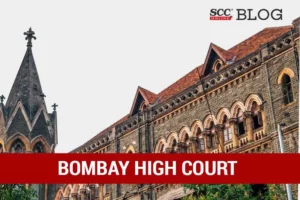Bombay High Court: In a writ petition filed under Article 226 of the Constitution of India challenging the judgment and order passed by the Divisional Caste Scrutiny Committee (‘Committee’) in a proceeding under Section 7 of Maharashtra Scheduled Castes, Scheduled Tribes, Denotified Tribes (Vimukta Jatis), Nomadic Tribes, Other Backward Classes and Special Backward Category (Regulation of Issuance and Verification of) Caste Certificate Act, 2000, wherein the petitioner’s claim of being a Hindu Mahar SC was refuted, the Division Bench of Mangesh S. Patil* and Shailesh P. Brahme, JJ. quashed the order and upheld the writ petition on the ground that the observations and conclusion of the committee were clearly perverse, arbitrary and capricious.
Factual Matrix
The petitioner contended that the Committee ignored the favourable entries which were ample in number but readily accepted some record that indicted her being converted to Christianity. Further, the church also informed the vigilance committee that neither the family members were baptised nor they were the members of the church in the vicinity of their village. Also, in the old school record, the petitioner’s paternal ancestor had been recorded as Mahar.
However, overlooking these facts the committee drew an inference of religious conversion by the petitioner’s family to Christianity on the finding that during the home visit the vigilance officer had seen the cross and the bust of Jesus Christ inside the house and burials have taken place according to Christianity rituals. The petitioner submitted that the observations made by the committee were perverse, arbitrary, and deprive the petitioner of social status and the benefits derivable therefrom.
Court Analysis
The Court admitted that the school record of the petitioner’s father recorded him as Hindu Mahar. Also, the petitioner’s grandfather in the receipts dated 30-04-1929 was expressly described as Mahar, but his name did not tally with the style of Mahar. The committee discarded the documents produced by the petitioner on the ground that the receipts did not indicate that the land was given as Mahar Watan.
The Court regarded such a reasoning as perverse and arbitrary since the committee was not called upon to consider if the family was holding some Mahar Watan land, but to consider if the old record was sufficient to substantiate the petitioner’s claim. The Court opined that “When there is no doubt about it being a genuine document, the committee could not have discarded it when it prima facie shows that petitioner’s grandfather was being treated as Mahar in the year 1929 and he could not have willingly accepted when there was untouchability in existence” and the Court found the same as clinching material to substantiate the petitioner’s claim.
The Court pointed out that the Committee had not stipulated the reason for discarding the petitioner’s explanation of having the cross and bust of Jesus Christ in his uncle’s house and not his father’s house. The only reason provided by the Committee was that the information was furnished by the petitioner’s grandfather. Further, the Court observed that when it comes to conversion to a different religion, the committee must bear in mind that a person gets caste by birth and remains forever unless there are circumstances indicative of the individual having embraced not only a new order but being outcasted from the original order.
Considering that there was no Baptism of any of the petitioner’s family members and they were not members of the church, the Court expressed that the findings of the Committee were not sufficient to conclude that the petitioner had been converted to Christianity and renounced her caste in the absence of any concrete proof.
The Court highlighted the observations made in Bhanudas v. State of Maharashtra, 2017 SCC OnLine Bom 7238, that the conclusion by the Committee of the petitioner is a Christian and not a Scheduled Caste should be made on concrete proof and the freedom of religion is not to be confused and equated with the caste and tribe. The caste or tribe cannot be changed and there is no way one can enter into another caste or tribe and exit from one caste or tribe into another.
The Court also referred to Chatturbhuj Vithaldas Jasani v. Moreshwar Parashram, 1954 SCR 817, wherein the Supreme Court stated that there are three factors that have to be considered:
-
Reactions of the old body,
-
Intentions of the individual himself, and
-
Rules of the new order.
The Court held that there was a dearth of material presented before the committee which could enable the Court to scrutinize discarding of the petitioner’s claim. Moreover, the contention by the Committee that the petitioner’s relatives were buried as a ritual which is followed by the Christianity mode of last rites was rejected by the Court as the same ritual is also followed in the Mahar caste, also, there has been no reference by the vigilance cells whether the burials had been in Christian burial grounds.
The Court highlighted that the petitioner was apparently married as per Hindu rites, whose photographs were also presented to the committee, and there was revenue recorded dated 1929 referring to the petitioner’s grandfather as Mahar. Except for the cross painted at the entrance and finding of Jesus Christ’s bust inside the house, there was no material before the Court to discard the petitioner’ claim. Thus, the Court ruled that the conclusion drawn by the Committee was clearly perverse, arbitrary and capricious, quashed and set aside the impugned order and directed the Divisional Caste Scrutiny Committee to issue the caste validity certificate to the petitioner as Hindu Mahar.
Judgment authored by: Justice Mangesh S. Patil
[Suvarna v. State of Maharashtra, 2023 SCC OnLine Bom 1457, Decided on 18-07-2023]
Advocates who appeared in this case :
Counsel for the petitioner: Advocate V.S. Bedre;
Counsel for the respondent: Additional Government Pleader M.A. Deshpande.

